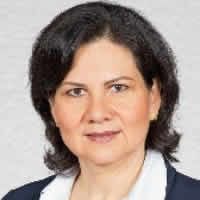Delgado-Fabián, Mónica
Overview
She is currently the National Director of the Chemical Engineering program and belongs to the faculty of the Department of Sustainable Technologies and Civil Engineering teaching the subjects: Ecological processes for human development, Evaluation of natural capital and sustainability principles, Application of the conservation of mass and energy, Natural resource management plan, Circular economy, among others. In addition to his work as a teacher, she is a member of the Academic Aspects of Career (EAAC) team, participating in the design of the curricula for the Chemical Engineer and in the design of courses for the 2019 Curricula.
She has collaborated in projects such as: implementation of the Circularity Assessment Protocol (CAP) Methodology in Mexico, a project carried out in collaboration with the University of Georgia, Ocean Conservancy, and FEMSA Foundation; Collaborative teaching in an international scheme enriched with technology, with Stony Brook University, Promotion of the culture of personal eco-efficiency with Fundación Iniciativa REDMIA A.C. among others.
She participated in various educational innovation projects, such as: "Collaborative Learning in the Flipped Classroom Model", "Microsoft Academic Ambassadors" and was the leader of the NOVUS 2016 project Effectiveness of the Flipped Classroom model in the academic performance of professional level students.
Coauthor in ¿An Integrated, Interconnected, Multi-disciplinary Approach for Fostering SD at the Monterrey Institute of Technology, Monterrey Campus¿ in Drivers and Barriers for Implementing Sustainable Development in Higher Education, and ¿An Interconnected approach to incorporate sustainable development at Tecnológico de Monterrey¿ in International Journal of Sustainability in Higher Education.
Academic background: Chemical Engineer from Tecnológico de Monterrey, Campus Monterrey (December 1992). In 1995 she obtained the degree of Master of Science with a specialty in Environmental Engineering.
Previous experience: From 1996 to May 2002, she was Director of Women's Residence Halls at Tecnológico de Monterrey and from May 2002 to December 2002, she was Director of Residence Halls Operation. From 1994 to 2015 she was a counselor, instructor, and advisor of the Program for the Promotion of Ecological Culture AC (FOMCEC) for whom she developed the "Practical Guide to install a waste separation program", the manual of "Education for Sustainable Development" and the chapter of "Waste and Responsible Consumption" within the educational material of the Civil Association. From 2002 to 2013 he collaborated in the Sustainable Campus Program of Tecnológico de Monterrey with the functions of proposing, implementing, and monitoring projects to incorporate sustainable practices on the Campus. For 19 years he participated as a member of the Recycling Committee of the Tecnológico de Monterrey, Campus Monterrey where he promoted the establishment of the waste separation and recycling program.
- Overview
- Publications
- Teaching
- Background
- Contact
- Other
- View All

 monica.delgado@tec.mx
monica.delgado@tec.mx